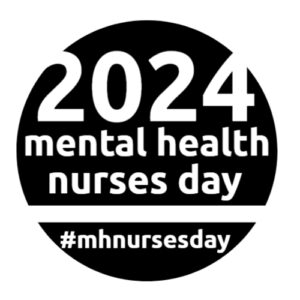Wednesday 21 February 2024 in the UK marked its 6th annual Mental Health Nurses’ Day. The day promotes and celebrates the unique and valuable role played by mental health nurses to health and wellbeing.
There are approximately 300,000 mental health nurses worldwide and they represent the largest proportion of staff in the mental health care workforce with responsibility for patient care1. Mental health nurses work in a diverse range of settings and with increasing demands for mental health care and services worldwide there are urgent calls to grow the Mental Health Nursing workforce to respond to this need2. Increasing the numbers of those who choose to enter the profession as well as retaining experienced mental health nurses is a priority for The NHS Long Term Workforce plan in England3.
In their recent update on nurse education, the Nuffield Trust4 called for action to challenge long-standing and negative perceptions of this profession to encourage more into this field of nursing. One-in-seven students who start a pre-registration mental health nurse course will not work as a mental health nurse4 and whilst there have been an increase in the number of mental health nurses, vacancy rates remain high, varying between 12 and 20% 2. More than ever, there is a need to ensure high quality specialist pre-registration mental health nurse education. Concern amongst Mental Health nurses regarding dilution of the curriculum with a move to genericism5,6,7 has led to widespread and significant debate across social media (#MHDeservesBetter). The mental health nursing workforce is ‘under-utilised, versatile and valuable’8 and there is good reason to celebrate and promote the specialist knowledge, skills and experiences of the mental health nurse. They make a unique and significant contribution to the lives and wellbeing of our communities.
This weeks blog was written by Deputy Editor, Jane Wray (J.Wray@hull.ac.uk)
References
- International Council of Nurses. (2022) The Global Mental Health Nursing Workforce: time to prioritise mental health and wellbeing [Online]. Available from: icn.ch/sites/default/files/inline-files/ICN_Mental_Health_Workforce_report_EN_web.pdf[Accessed 23 February 2024].
- Health Education England (2022) Commitment and Growth: advancing mental health nursing now and for the future Commitment and Growth: advancing mental health nursing now and for the future (hee.nhs.uk)
- NHS England. (2023). NHS Long Term Workforce Plan NHS Long Term Workforce Plan (england.nhs.uk)
- Palmer W, Dodsworth E, Rolewicz L (2023) Research report. In train? Progress on mental health nurse education. The Nuffield Foundation In train? Progress on mental health nurse education (nhsconfed.org).
- Warrender, D, Connell C, Jones E, Monteux S, Colwell L, Laker C, Cromar-Hayes M (2023) Mental health deserves better: Resisting the dilution of specialist pre-registration mental health nurse education in the United Kingdom. International Journal of Mental Health Nursing, 22(1) pgs. 202-212 https://doi.org/10.1111/inm.13236
- Connell, C., Jones, E., Haslam, M., Firestone, J., Pope, G.& Thompson, C. (2022) Mental health nursing identity: a critical analysis of the UK’s nursing and midwifery Council’s pre-registration syllabus change and subsequent move towards genericism. Mental Health Review Journal, 27(4), 472–483. Available from: https://doi.org/10.1108/MHRJ-02-2022-0012
- McKeown, M.(2023) Resisting genericization: towards the renewal of mental health nursing. Journal of Advanced Nursing, 79, 3189–3191. Available from: https://doi.org/10.1111/jan.15598
- Hurley, J., Lakeman, R., Linsley, P., Ramsay, M.& Mckenna-Lawson, S. (2022) Utilizing the mental health nursing workforce: a scoping review of mental health nursing clinical roles and identities. International Journal of Mental Health Nursing, 31, 796–822. Available from: https://doi.org/10.1111/inm.12983
